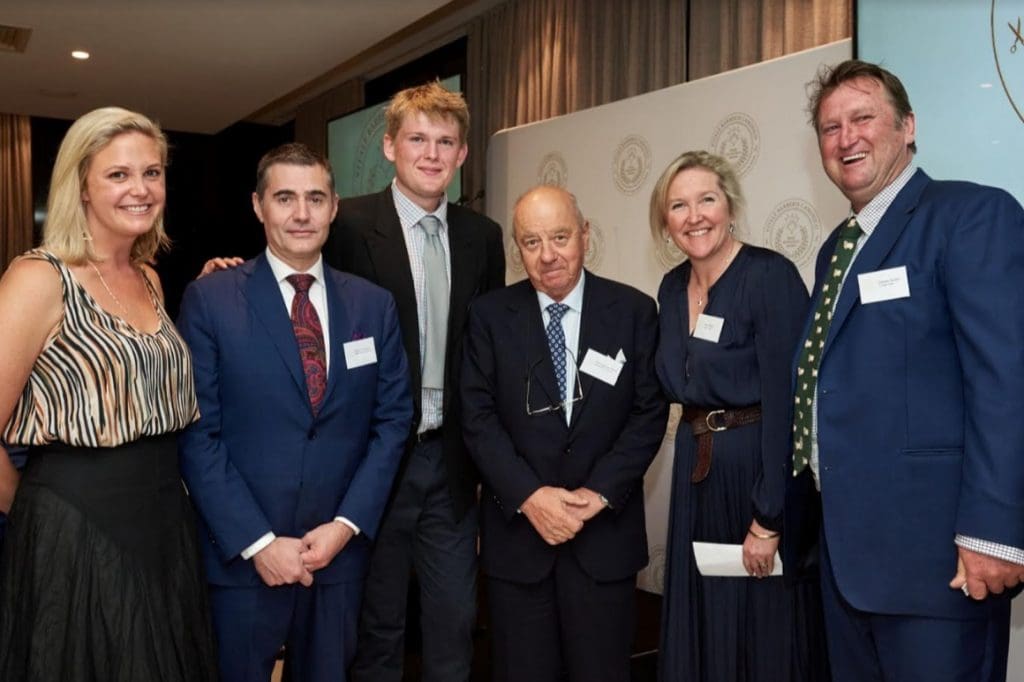
At the VBC Wool Excellence Club awards were, from left, Phoebe Croyle, Davide Fontaneto, Jack Barber, Alberto Barberis Canonico, Jess Barber and Duncan Barber.

VBC raw procurement manager Davide Fontaneto
ITALIAN wool processor Vitale Barberis Canonico will not buy wool grown by its exclusive Wool Excellence Club members from surgically mulesed sheep or those treated with breech freeze branding from 2021.
As a way of sending a strong message to Australian wool producers, from next season VBC will increase discounts in its WEC contract for wool declared as coming from sheep mulesed with pain relief (PR) or which have had other breech modifications.
During the company’s recent Wool Excellence Club awards in Melbourne, VBC raw procurement manager Davide Fontaneto said from season 2021/2022, VBC won’t accept mulesed wool from club members.
He said this is due to pressure from VBC customers. Season 2020 starts with the first auction selling week after 29 June next year, and season 2021 starts in the week of July that year.
“We are buying member’s wool at a consistently higher price than the market and we feel that today our customers think that it is no longer possible to give any sort of premium for mulesed wool,” Mr Fontaneto told Sheep Central.
“Currently we don’t consider wool coming from animals subject to freeze branding as non-mulesed, because there is still a breech modification.”
Mr Fontaneto said that despite the fact that the accepted Australian definition of mulesing involves the use of shears, the market regards any breech modification as mulesing.
“We are not stating we are against that method (freeze branding), but we think it should be clearly identified through the National Wool Declaration.”
Under the Australian Animal Welfare Standards and Guidelines for Sheep, mulesing is the removal of skin from the breech and/or tail of a sheep using mulesing shears. However
Mr Fontaneto said VBC currently has higher price limits in the auction system and contracts for non-mulesed – much higher than wool from sheep mulesed with pain relief.
“Currently, we don’t offer any contracts for mulesed wool without the use of PR.”
He said Australia is the best producer of high quality and stylish wool in the world.
“We cannot avoid buying quantities we need from Australia as our volumes are very large.
“But we want to help and bring Australian farmers towards a production better accepted by the final consumer and not exposed to any possible criticism,” he said.
“Wool should really be felt as a natural, sustainable fibre.
“We want to send out a warning, but at the same time, a clear message of support for Australian wool producers.”
Mr Fontaneto said the use of pain relief products is still really important and the most important Australian sustainability and animal welfare protocols (such as Sustainawool) do not involve any farm mulesing without pain relief.
“Nevertheless, the market is concerned just about mulesing, regardless of the method.”
Mr Fontaneto said market discounting of wool from mulesed sheep by more buyers and processors is “an inevitable trend.”
“The market is already displaying a difference.
“Not only in Australia; it happens that lower style wool from other countries receive better prices just because it is non-mulesed.”
When asked if there are now separate markets for wool from mulesed or non-mulesed wool sheep, Mr Fontaneto said “the market is just one” although there are buyers not caring about the “problem”.
“But the most famous brands all around the world are asking for fabrics where traceability and sustainability are a “must”.
“And consequently, increased competition on non-mulesed wool will lead to higher prices.”
Mr Fontaneto said his company can see a day when demand for wool from mulesed sheep will be overtaken by non-mulesed wool demand.
“Yes, we do, especially for the highest quality.”
The company is also concerned that the amount of non-mulesed wool is not increasing fast enough to meet demand.
“Yes, we are really concerned.
“In the last few years we had to increase our supplies from other countries in order to meet the needed quantities for our productions,” he said.
“We have always been really supportive of the Australian wool industry.
“Our history has always gone with Australia,” Mr Fontaneto said.
“Of course if we find quality, quantities and right specifications we will keep supporting Australian wool.”

Glenn, you are on the right track; it’s all a load of nonsense and a con job.
1. No one in the world can tell the difference between wool from mulesed and unmulesed sheep once it is off the sheep.
2. Talk of traceability is rubbish; once it is scoured its identity is lost forever and it is all unmulesed.
3. We are unaware of any product with labels such as ” Made from wool from mulesed sheep.” Where does it go? It is all too ridiculous to continue.
Nothings inevitable except death and taxes. I am not so sure about taxes. Bottom of harbour and the white shoe brigade didn’t pay much. Wool brokers have said there is no premium in Western Australia. Where is it on a market report? If you are pandering to animal liberationists and vegans, I don’t see the point, as they won’t buy what your selling anyway. What are you going to do when they want tailing stopped or ear marking or shearing?